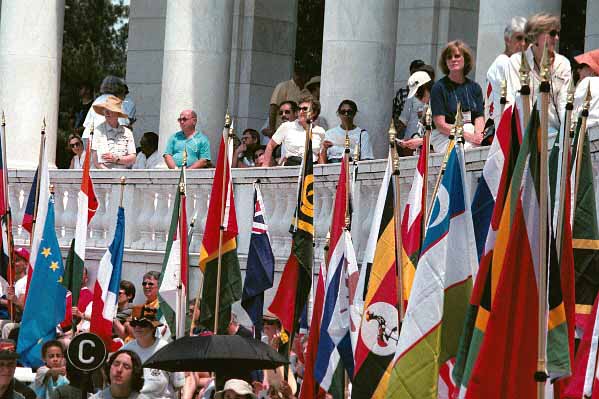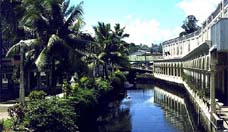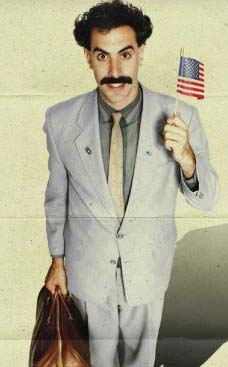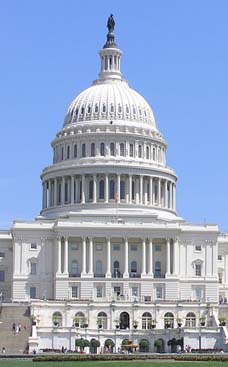2006.12.01: December 1, 2006: Headlines: COS - India: National Service: Speaking Out: Orlando Sentinel: India RPCV Charles L. Griffin Jr. writes: I am for universal national service
Peace Corps Online:
Directory:
India:
Peace Corps India:
Peace Corps India: New Stories:
2006.12.01: December 1, 2006: Headlines: COS - India: National Service: Speaking Out: Orlando Sentinel: India RPCV Charles L. Griffin Jr. writes: I am for universal national service
India RPCV Charles L. Griffin Jr. writes: I am for universal national service

"I served in a draft Army, but as a volunteer. I followed that with two years in the Peace Corps, also as a volunteer. In total, I put in five years of service that gave me experiences that would have been difficult to gain on my own. Volunteers in the Peace Corps were also from every walk of life, with the exception that most were college graduates or had valuable life experience to share. Young people, 18 to 30 years of age, mixed with professionals or retirees who might be as old as 80, and all trained together before being broadcast about some developing country to isolated spots in a totally foreign culture. It was not something they all could handle. Being volunteers, they could un-volunteer at any time, and many did. Some simply could not meet the physical requirements or could not adjust to a different culture or the lack of privacy. Through these experiences I came to believe that the dynamics of becoming engaged in an alien culture, and I include the rituals and traditions of the military as a culture alien to everyday Americans, is as valuable in one's education as a degree. Perhaps more so."
India RPCV Charles L. Griffin Jr. writes: I am for universal national service
Alternative worth considering?
Charles L. Griffin Jr. |
Posted December 1, 2006
I served in a draft Army, but as a volunteer. I followed that with two years in the Peace Corps, also as a volunteer. In total, I put in five years of service that gave me experiences that would have been difficult to gain on my own.
Among the draftees in the Army were raw youths from around the country who, often for the first time, met people totally unlike themselves. It became an unparalleled learning experience. There were married teachers, aspiring actors, ghetto youth, kids straight off a farm, city-bred wiseguys, Hispanics from Puerto Rico, Texas and the West, and immigrants from around the world. They all began as various shades of black, white and brown who came together in the Big Green Machine and learned how to work and play together. It wasn't a perfect melting pot. Bigots could remain bigots, the ignorant could stay ignorant, but for the majority it worked.
For many of them, it was not something they would have chosen to do.
During the same time frame, the Peace Corps began. Volunteers in the Peace Corps were also from every walk of life, with the exception that most were college graduates or had valuable life experience to share. Young people, 18 to 30 years of age, mixed with professionals or retirees who might be as old as 80, and all trained together before being broadcast about some developing country to isolated spots in a totally foreign culture. It was not something they all could handle. Being volunteers, they could un-volunteer at any time, and many did. Some simply could not meet the physical requirements or could not adjust to a different culture or the lack of privacy.
Through these experiences I came to believe that the dynamics of becoming engaged in an alien culture, and I include the rituals and traditions of the military as a culture alien to everyday Americans, is as valuable in one's education as a degree. Perhaps more so.
For that reason, I am against a draft. I am for universal national service. I believe that every American youth should be required to serve at least two years in federal service, with the option of doing so after either high school or college graduation. I believe that all of them should be required to undergo two months of basic military training to acquaint them with physical exercise and the handling of firearms, field sanitation, first aid and survival training.
Following that, they should have the option of continuing in the military (with the advanced training that requires) or several choices of public service in America or abroad, including any necessary training for the duties of that service.
At the end of two or three years, most people who experienced such service will want to resume their lives, go back to family, friends and a regular job or further education. Some few will want to continue their service. This was true for the military when I served and is true today. It is also true for many of those who served in the Peace Corps, although they were prohibited by law from doing more than five years' service as a volunteer. Many former volunteers have gone on to greater public service as educators, diplomats and occasionally as politicians.
But so have many veterans of military service. The ultimate benefit of both kinds of service is the production of citizens knowledgeable of the sacrifice and dedication of those who work to better the world or protect it from those who would bring about chaos and destruction. Neither route is safe. There is a long list of volunteers who died in service and a much longer list of those who died in the military.
Today's American youth are famously regarded as soft, fat and self-centered. While there are many exceptions to that stereotype, a universal national-service requirement would go a long way in countering the trend.
Charles L. Griffin Jr., a photographer and writer, lives in Daytona Beach.
Links to Related Topics (Tags):
Headlines: December, 2006; Peace Corps India; Directory of India RPCVs; Messages and Announcements for India RPCVs; National Service; Speaking Out
When this story was posted in January 2007, this was on the front page of PCOL:





Peace Corps Online The Independent News Forum serving Returned Peace Corps Volunteers
 | All Volunteers Safe in Fiji
All Volunteers in Fiji are safe and accounted for. The Peace Corps is monitoring the situation very closely. Volunteers are on standfast but there are no plans for evacuation at this time. Peace Corps is working closely with the US embassy and with host country partners to monitor the situation. Peace Corps is confident that volunteers are not in harm's way. The military seized control of Fiji on December 5 after weeks of threats. Subscribe to our news feed to read the latest breaking news. |
 | Ron Tschetter in Morocco and Jordan
On his first official trip since being confirmed as Peace Corps Director, Ron Tschetter (shown at left with PCV Tia Tucker) is on a ten day trip to Morocco and Jordan. Traveling with his wife (Both are RPCVs.), Tschetter met with volunteers in Morocco working in environment, youth development, health, and small business development. He began his trip to Jordan by meeting with His Majesty King Abdullah II and Her Majesty Queen Rania Al Abdullah and discussed expanding the program there in the near future. |
 | Chris Dodd's Vision for the Peace Corps
Senator Chris Dodd (RPCV Dominican Republic) spoke at the ceremony for this year's Shriver Award and elaborated on issues he raised at Ron Tschetter's hearings. Dodd plans to introduce legislation that may include: setting aside a portion of Peace Corps' budget as seed money for demonstration projects and third goal activities (after adjusting the annual budget upward to accommodate the added expense), more volunteer input into Peace Corps operations, removing medical, healthcare and tax impediments that discourage older volunteers, providing more transparency in the medical screening and appeals process, a more comprehensive health safety net for recently-returned volunteers, and authorizing volunteers to accept, under certain circumstances, private donations to support their development projects. He plans to circulate draft legislation for review to members of the Peace Corps community and welcomes RPCV comments. |
 | He served with honor
One year ago, Staff Sgt. Robert J. Paul (RPCV Kenya) carried on an ongoing dialog on this website on the military and the peace corps and his role as a member of a Civil Affairs Team in Iraq and Afghanistan. We have just received a report that Sargeant Paul has been killed by a car bomb in Kabul. Words cannot express our feeling of loss for this tremendous injury to the entire RPCV community. Most of us didn't know him personally but we knew him from his words. Our thoughts go out to his family and friends. He was one of ours and he served with honor. |
 | Peace Corps' Screening and Medical Clearance
The purpose of Peace Corps' screening and medical clearance process is to ensure safe accommodation for applicants and minimize undue risk exposure for volunteers to allow PCVS to complete their service without compromising their entry health status. To further these goals, PCOL has obtained a copy of the Peace Corps Screening Guidelines Manual through the Freedom of Information Act (FOIA) and has posted it in the "Peace Corps Library." Applicants and Medical Professionals (especially those who have already served as volunteers) are urged to review the guidelines and leave their comments and suggestions. Then read the story of one RPCV's journey through medical screening and his suggestions for changes to the process. |
 | The Peace Corps is "fashionable" again
The LA Times says that "the Peace Corps is booming again and "It's hard to know exactly what's behind the resurgence." PCOL Comment: Since the founding of the Peace Corps 45 years ago, Americans have answered Kennedy's call: "Ask not what your country can do for you--ask what you can do for your country. My fellow citizens of the world: ask not what America will do for you, but what together we can do for the freedom of man." Over 182,000 have served. Another 200,000 have applied and been unable to serve because of lack of Congressional funding. The Peace Corps has never gone out of fashion. It's Congress that hasn't been keeping pace. |
 | PCOL readership increases 100%
Monthly readership on "Peace Corps Online" has increased in the past twelve months to 350,000 visitors - over eleven thousand every day - a 100% increase since this time last year. Thanks again, RPCVs and Friends of the Peace Corps, for making PCOL your source of information for the Peace Corps community. And thanks for supporting the Peace Corps Library and History of the Peace Corps. Stay tuned, the best is yet to come. |
 | History of the Peace Corps
PCOL is proud to announce that Phase One of the "History of the Peace Corps" is now available online. This installment includes over 5,000 pages of primary source documents from the archives of the Peace Corps including every issue of "Peace Corps News," "Peace Corps Times," "Peace Corps Volunteer," "Action Update," and every annual report of the Peace Corps to Congress since 1961. "Ask Not" is an ongoing project. Read how you can help. |
Read the stories and leave your comments.

Some postings on Peace Corps Online are provided to the individual members of this group without permission of the copyright owner for the non-profit purposes of criticism, comment, education, scholarship, and research under the "Fair Use" provisions of U.S. Government copyright laws and they may not be distributed further without permission of the copyright owner. Peace Corps Online does not vouch for the accuracy of the content of the postings, which is the sole responsibility of the copyright holder.
Story Source: Orlando Sentinel
This story has been posted in the following forums: : Headlines; COS - India; National Service; Speaking Out
PCOL35429
94



















